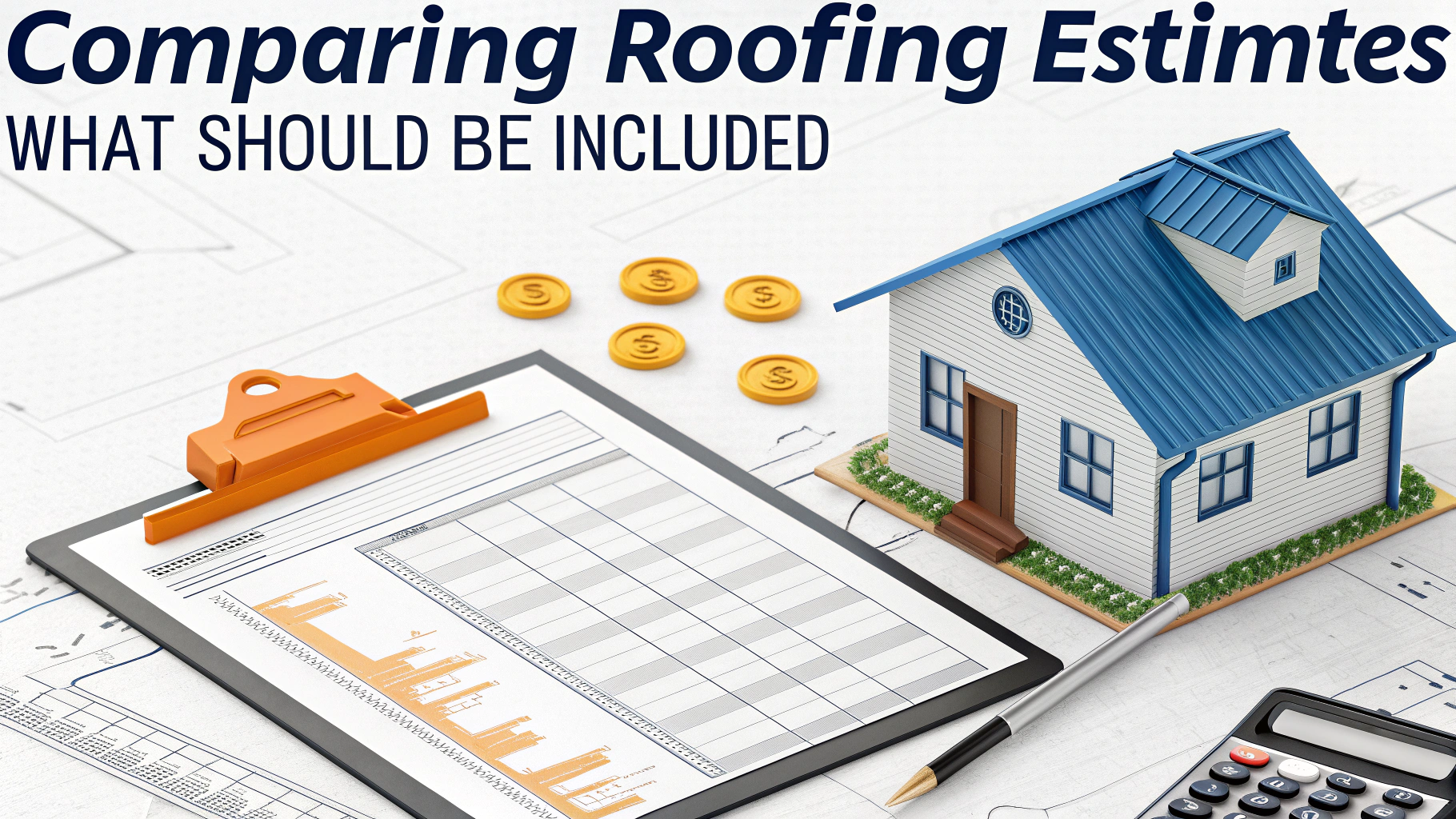Getting multiple roofing estimates is a smart way to ensure you’re making an informed decision about your home improvement project.
A detailed roofing estimate helps you understand exactly what work will be performed and prevents unexpected costs from arising during the project.
This quick guide breaks down the key elements that should be included in every roofing estimate, helping you compare quotes effectively and choose the right contractor for your Colorado home.
Essential Components of a Roofing Estimate
- Company Information
- Full business name and physical address
- Phone number and email
- License numbers and insurance details
- References and certifications
- Project Details
- Square footage of roof area
- Materials specifications and brands
- Color and style selections
- Project timeline and completion date
Cost Breakdown
A professional estimate should itemize these specific costs:
- Materials
- Shingles or roofing material
- Underlayment and ice barriers
- Flashing and vents
- Fasteners and adhesives
- Labor
- Tear-off and disposal
- Installation costs
- Clean-up fees
Warranty Information
Look for these warranty details in your estimate:
- Manufacturer warranty on materials
- Contractor workmanship guarantee
- Terms and conditions of coverage
- Transfer options for warranties
Payment Terms
- Payment schedule and acceptable methods
- Deposit requirements
- Progress payment milestones
- Final payment conditions
Red Flags to Watch For
- Missing license or insurance information
- Vague material descriptions
- No written warranty information
- Pressure to decide immediately
- Significantly lower prices than other estimates
Colorado-Specific Requirements
Colorado roofing contractors must provide these specific items:
- Proof of liability insurance ($1,000,000 minimum)
- Workers compensation insurance
- Local building permits
- Compliance with Colorado Senate Bill 38
Making Your Final Decision
Consider these factors when comparing estimates:
- Quality of materials offered
- Experience and reputation of contractor
- Timeline for completion
- Communication and professionalism
- Value rather than just price
Next Steps for Your Roofing Project
Contact the Colorado Roofing Association at (303) 484-0549 or visit coloradoroofing.org for contractor verification and additional resources.
Request at least three estimates from different contractors to ensure competitive pricing and comprehensive coverage for your project.
Document all communications and keep copies of estimates, contracts, and warranty information in a safe place for future reference.
Questions to Ask Your Contractor
- Experience and History
- How long have you been in business?
- Can you provide local references?
- What is your experience with my type of roof?
- Project Specifics
- Who will supervise the project?
- What happens if bad weather delays work?
- How do you protect my property during the project?
Understanding Your Rights
Colorado homeowners have specific protections under state law:
- Right to cancel within 72 hours of signing
- Access to all insurance claim information
- Right to choose your own contractor
- Protection against fraudulent practices
Documentation Requirements
- Written contract with all terms
- Copies of permits and inspections
- Insurance certificates
- Material warranties and guarantees
- Maintenance instructions
Protecting Your Roofing Investment
Secure your home’s future with these final steps:
- Keep all documentation in a secure location
- Schedule regular maintenance inspections
- Register manufacturer warranties
- Maintain records of all repairs and services
- Know who to contact for future service needs
FAQs
- What essential components should a professional roofing estimate include?
A proper roofing estimate should include material specifications, labor costs, timeline, warranty details, contractor’s license information, insurance coverage, payment terms, and a detailed scope of work including tear-off and disposal. - How do I compare material costs between different roofing estimates?
Look for specific brand names, material grades, and quantities listed. Compare shingle types, underlayment quality, and additional materials like flashing, vents, and ice barriers to ensure you’re comparing equivalent products. - What warranty information should be included in a roofing estimate?
The estimate should outline both manufacturer’s material warranty and contractor’s workmanship warranty, including coverage periods, terms, and conditions for each type of coverage. - Should permits and inspection costs be included in the estimate?
Yes, all required local building permits and inspection fees should be clearly listed in the estimate. A reputable contractor will handle these arrangements and include associated costs. - How should labor costs be broken down in a roofing estimate?
Labor costs should detail crew size, estimated work hours, specific tasks (removal, installation, cleanup), and any specialized labor requirements for features like skylights or complex roof sections. - What insurance documentation should contractors provide with their estimate?
Contractors should provide proof of both worker’s compensation and general liability insurance. The estimate should include their insurance policy numbers and coverage amounts. - How should the payment schedule be structured in a roofing estimate?
A typical payment schedule includes an initial deposit (usually 10-30%), possible progress payments for larger jobs, and final payment upon completion and inspection. These terms should be clearly outlined in the estimate. - What specific cleanup and disposal services should be included?
The estimate should detail magnetic nail sweep services, debris removal methods, dumpster placement, protection of landscaping, and proper disposal of old roofing materials in accordance with local regulations. - How should ventilation improvements be addressed in the estimate?
The estimate should specify any necessary ventilation upgrades, including types and quantities of vents to be installed, and whether existing ventilation needs modification to meet current building codes. - What emergency repair provisions should be included in the estimate?
The estimate should address potential hidden damage discovery and include provisions for additional repairs, with specific unit pricing for replacement of damaged decking or other structural components.
